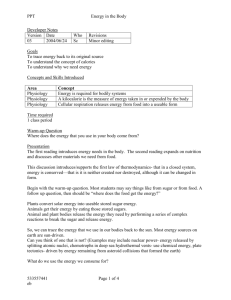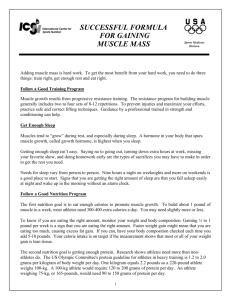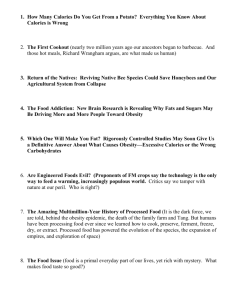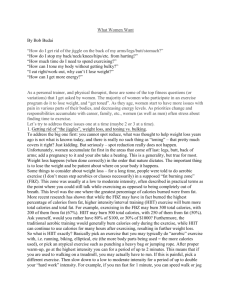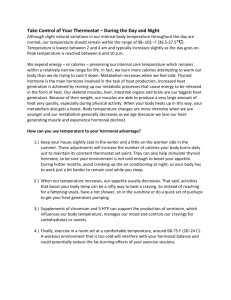athpro
advertisement
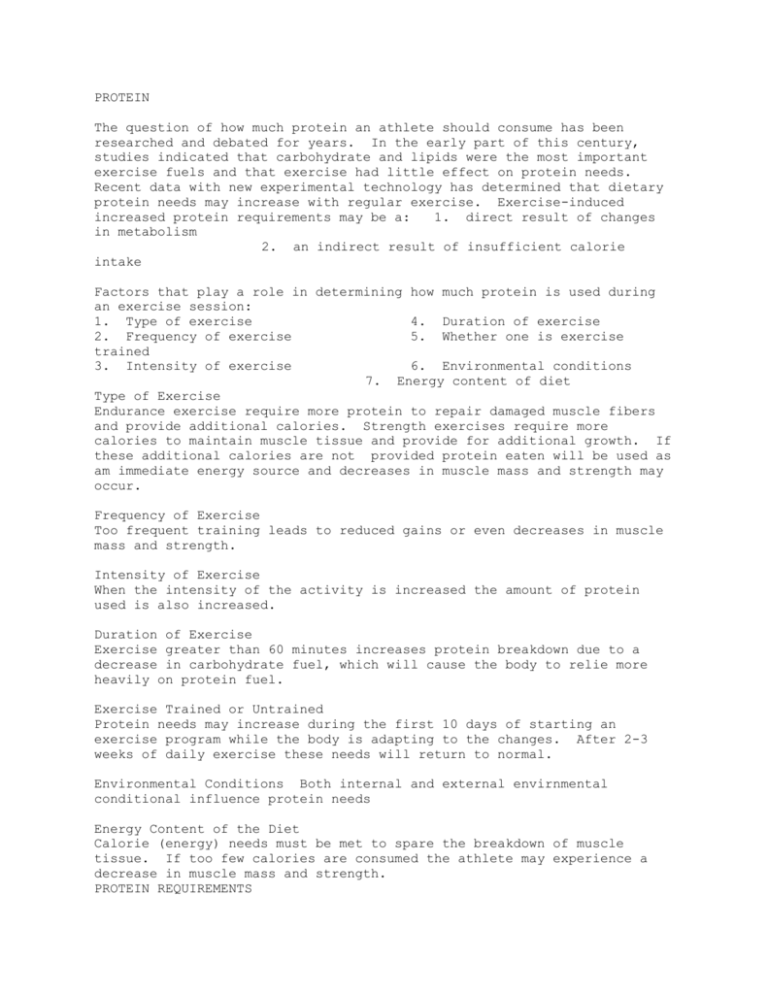
PROTEIN The question of how much protein an athlete should consume has been researched and debated for years. In the early part of this century, studies indicated that carbohydrate and lipids were the most important exercise fuels and that exercise had little effect on protein needs. Recent data with new experimental technology has determined that dietary protein needs may increase with regular exercise. Exercise-induced increased protein requirements may be a: 1. direct result of changes in metabolism 2. an indirect result of insufficient calorie intake Factors that play a role in determining how much protein is used during an exercise session: 1. Type of exercise 4. Duration of exercise 2. Frequency of exercise 5. Whether one is exercise trained 3. Intensity of exercise 6. Environmental conditions 7. Energy content of diet Type of Exercise Endurance exercise require more protein to repair damaged muscle fibers and provide additional calories. Strength exercises require more calories to maintain muscle tissue and provide for additional growth. If these additional calories are not provided protein eaten will be used as am immediate energy source and decreases in muscle mass and strength may occur. Frequency of Exercise Too frequent training leads to reduced gains or even decreases in muscle mass and strength. Intensity of Exercise When the intensity of the activity is increased the amount of protein used is also increased. Duration of Exercise Exercise greater than 60 minutes increases protein breakdown due to a decrease in carbohydrate fuel, which will cause the body to relie more heavily on protein fuel. Exercise Trained or Untrained Protein needs may increase during the first 10 days of starting an exercise program while the body is adapting to the changes. After 2-3 weeks of daily exercise these needs will return to normal. Environmental Conditions Both internal and external envirnmental conditional influence protein needs Energy Content of the Diet Calorie (energy) needs must be met to spare the breakdown of muscle tissue. If too few calories are consumed the athlete may experience a decrease in muscle mass and strength. PROTEIN REQUIREMENTS Endurance athletes should consume 12-15% of their total calories from protein. Protein needs can be calculated by multiplying 1.0- 1.4 grams of protein per kilogram body weight (refer to the following chart calculations) Strength athletes with short bouts of extreme intensity use mostly carbohydrate for fuel. Protein should also provide 12-15% of their total calories. Dangers of excessive protein Increase stress on the liver and kidney Increase amonia and urea levels (toxicity levels increase) * Increase fluid needs- greater potential for dehydration Increase nitrogen residuals- nitrogen by products are toxic and less glyocen can be stored when there is excess protein. * Metabolism of protein requires more water than carbohydrate or fat. As dietary protein increases, water intake is recommended to minimize dehydration effects. Caution: if high levels of protein are being used be sure to increase fluid. Protein supplementation Amino acids continuously breakdown and resythesize. are oxidized for energy or stored as fat. Excess amino acids DO I EAT ENOUGH PROTEIN? Protein needs vary between individuals based on body size, activity level, and age. Protein needs may increase directly as a result of changes in metabolism or indirectly as a result of insufficient calories in the diet. Body Wt Body PROTEIN NEEDS PER KILOGRAM BODY WEIGHT Wt DAILY PROTEIN NEEDS measured in grams Body Wt (lbs) 95 100 105 110 115 120 125 130 135 140 145 150 155 160 165 170 175 180 185 190 195 200 205 210 215 220 225 230 235 240 245 Body .8 1 1.2 1.4 1.5 1.6 35 36 38 40 42 44 45 47 49 51 53 54 56 57 60 62 64 66 67 69 71 73 74 76 78 80 82 84 86 87 89 43 45 48 50 52 55 57 59 61 64 66 68 70 71 75 77 80 82 84 86 89 91 93 95 98 100 102 105 107 109 111 52 54 58 60 62 66 68 71 73 77 79 82 84 85 90 92 96 98 101 103 107 109 112 114 118 120 122 126 128 131 133 60 63 67 70 73 77 80 83 85 90 92 95 98 99 105 108 112 115 118 120 125 127 130 133 137 140 143 147 150 153 155 65 68 72 75 78 83 86 89 92 96 99 102 105 107 113 116 120 123 126 129 134 137 140 143 147 150 153 158 161 164 167 69 72 77 80 83 88 91 94 98 102 106 109 112 114 120 123 128 131 134 138 142 146 149 152 157 160 163 168 171 174 178 Wt (kg) 43 45 48 50 52 55 57 59 61 64 66 68 70 71 75 77 80 82 84 86 89 91 93 95 98 100 102 105 107 109 111



